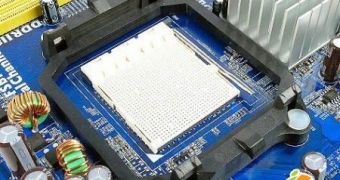While Advanced Micro Devices promised a central processing unit architecture that will revolutionize computing experience for both the server and the consumer segments thanks to a larger number of cores and some innovative technologies, it looks as if the manufacturing company did not mention to its clients one important aspect of the hardware makeup that is to be found on these processors. The new generation of Advanced Micro Devices processors come with some hidden capabilities that the company did not make public, like the already enabled support for DDR3 random access memory.
Currently AMD is pretty conservative about the jump to DDR3 system memory and maybe this position comes as a direct consequence of the fact that every new type of memory must be placed on a different hardware platform and in its present state, AMD could hardly cope with the effort needed to develop and manufacture several platforms at the same time. This does not mean however that the current processors recently released by AMD do not offer integrated support for the system memory type, according to the news site xbitlabs.
The aforementioned site claims that some documents on technical specifications released by AMD state that the quad core server intended Opteron processors, their Phenom counterparts designed for desktop use and all their derivate products, are all equipped with the necessary memory controllers to handle the DDR3 random access memory, provided of course that such a processor is placed within a compatible mainboard with both the CPU socket and the DDR3 memory slots and that an appropriate BIOS is installed.
An official AMD roadmap states that DDR3 memory support will be enabled only on central processing units built using the 45 nanometer fabrication process which will be housed in a new socket, named AM3, due to come out sometimes in the second half of 2008. Because the technical reports about the K10 processor architecture includes references to the next generation of processor sockets and to the DDR3 memory standard, it is very likely that even the current iteration of AMD processors offers support for the new memory standard, but as there are no mainboards compatible with both the CPU socket and the memory slots available at the moment, it all remains in the domain of speculations.
The presence of an integrated memory controller that can support both types of memory inside the current processor architecture, will mean that Advanced Micro Devices will face an easier transition to a dedicated DDR3 platform, as even current processing units may be compatible with the new platform.

 14 DAY TRIAL //
14 DAY TRIAL //